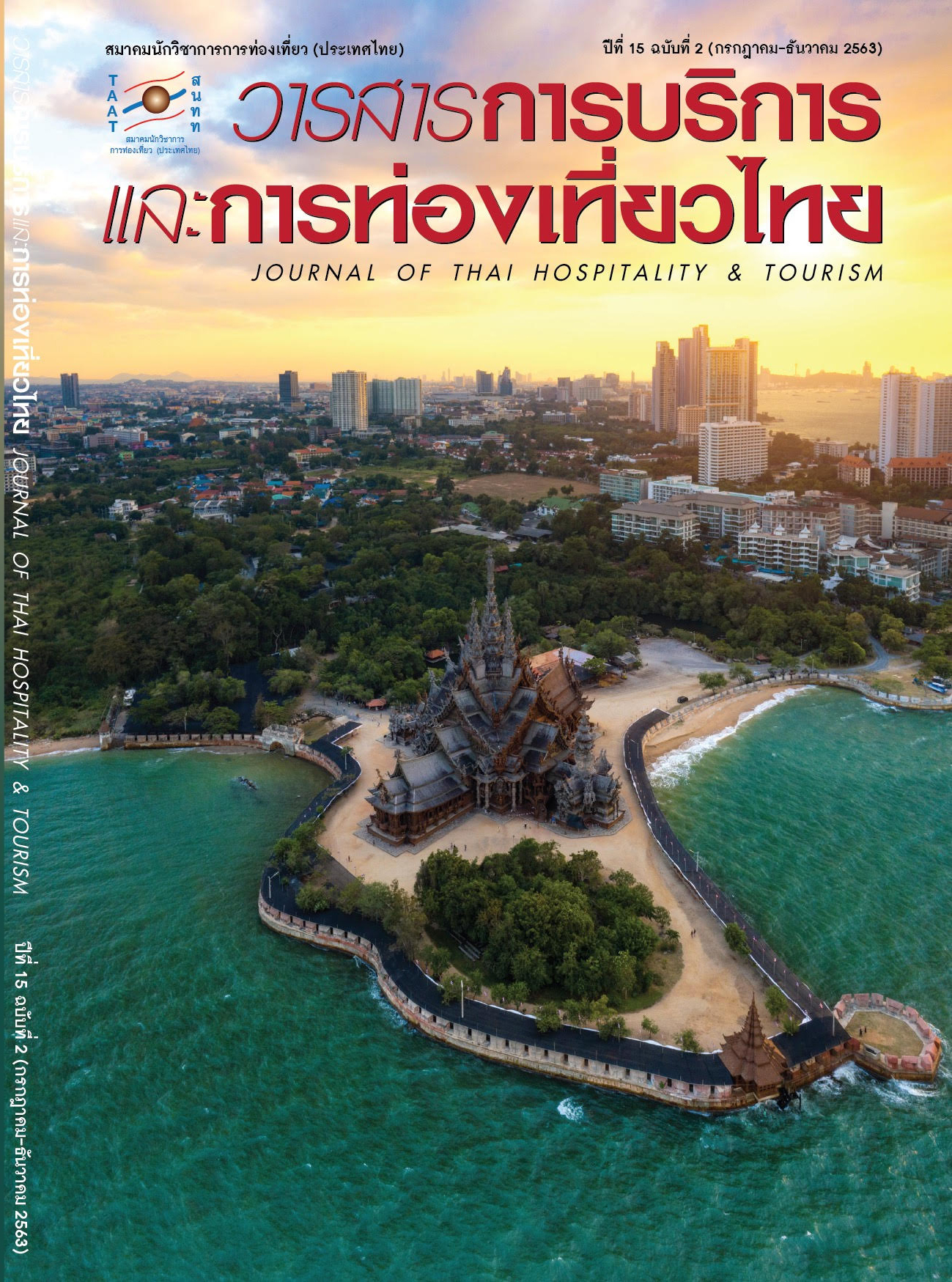Barriers in Sustainable Management Practices of Hotel’s Event Venue in Bangkok, Thailand
Main Article Content
Abstract
The purpose of the research was to explore the barriers to the implementation of sustainable event management (SEM) practices faced by 5–star hotel venues in Bangkok. Five semi–structured interviews were conducted to collect data from four hotels located in the business district in Bangkok, Thailand. The results indicated that two different types of barriers between hotels that adopted sustainability as their core value and those that did not have much sustainable experience. The findings suggested that these barriers could be alleviated through education and stakeholder involvement.
Article Details
References
Black, N. (2016). Festival Connections: How Consistent and Innovative Connections Enable Small–scale Rural Festivals to Contribute to Socially Sustainable Events. International Journal of Event and Festival Management, 7(3), 172–187.
British Standards Institution. (2017). ISO 20121 Sustainable Event Management. Retrieved from https://www.bsigroup.com/en–TH/ISO–20121–Sustainable–Event– Management.
Carson, R. (1962). Silent Spring. Houghton Mifflin: New York.
Dickson, C. & Arcodia, C. (2010). Promoting Sustainable Event Practice: The Role of Professional Associations. International Journal of Hospitality Management, 29(2), 236–244.
Hardin, G. (1968). The Tragedy of the Commons. Science, New Series, 162(3859), 1243–1248.
Indaver. (2014). Waste Regulation Guide Understanding Irish Waste Regulation. Retrieved from http://www.indaver.ie/fileadmin/indaver/Pictures/Ireland/Policy/Waste_ Legislation_GuideWeb_FINAL.pdf.
International Congress and Convention Association. (2017). ICCA Statistics Reports 2016. Retrieved from http://www.iccaworld.org/knowledge/benefit.cfm?benefitid=4036.
International Institute for Sustainable Development. (2012). Sustainable Development Timeline. Retrieved from https://www.iisd.org/pdf/2012/sd_timeline_2012.pdf.
Laing, J. & Frost, W. (2010). How Green is My Festival: Exploring Challenges and Opportunities Associated with Staging Green Events. International Journal of Hospitality Management, 29(2), 261–267.
Lee, S. & Slocum, S. (2015). Understanding the Role of Local Food in the Meeting Industry: An Exploratory Study of Meeting Planners’ Perception of Local Food in Sustainable Meeting Planning. Journal of Convention & Event Tourism, 16, 45–60.
Liang, Y., Wang, C., Tsaur, S., Yen, C. & Tu, J. (2016). Mega–event and Urban Sustainable Development. International Journal of Event and Festival Management, 7(3), 152–171.
Redclift, M. (1992). The Meaning of Sustainable Development. Geoforum, 23(3), 395–403.
SGS. (2014). Case Study: Plaza Athénée Bangkok, A Royal Méridien Hotel the First Hotel in the World Awarded ISO20121 Certification. Retrieved from http://www.sgs.co.th/~/media/Local/Thailand/Documents/Case%20Studies/SGSSSCISO%2020121%20Plaza%20Athenee%20Case%20StudyA4EN1402Approved.pdf
Singapore Tourism Board. (2013). Sustainability Guidelines for the Singapore MICE Industry. Retrieved from http://www.visitsingapore.com/content/dam/MICE/Global/downloads/STB_sustainability_guidelines_manual_november_2013.pdf.
Sloan, P., Legard, W., & Chen, J. S. (2013). Sustainable in the Hospitality Industry: Principles of Sustainable Operations. 2nd ed. Routledge, New York.
Thailand Convention & Exhibition Bureau. (2016). Venue Collection 2016 Thailand. Retrieved from https://www.businesseventsthailand.com/fileadmin/user_upload/documents/digital–brochure/thai–venues/Venue_Collection_2016_Thailand.pdf.
Thailand Convention & Exhibition Bureau. (2017a). Thai MICE reaches New Heights. Retrieved from https://www.businesseventsthailand.com/nc/news–download/news–download/detail/article/1018–thai–mice–reaches–new–heights/.
Thailand Convention & Exhibition Bureau. (2017b). Thailand MICE Review 2016. Bangkok: Thailand Convention & Exhibition Bureau (Public Organization).
Thailand Convention & Exhibition Bureau. (2017c). TCEB Initiates “SMART MICE” Strategy to Upgrade MICE Events with Smart Innovation in Line with Thailand 4.0 Policy. Retrieved from ้ttps://www.businesseventsthailand.com/nc/news–download/news–download/detail/article/1012–tceb–initiates–smart–mice–strategy–to–upgrade–mice–events–with–smart–innovation–in–line/.
Tinnish, S. (2012). Barriers and Enablers to the Adoption of the ISO 20121 Standard for Event Sustainability Management. Retrieved from https://www.scribd.com/document/311201930/Barriers–and–Enablers–to–Adoption–of–ISO–20121.
United Nations Environment Programme. (2012). Sustainable Event Guide. Retrieved from http://worldcongress2012.iclei.org/fileadmin/templates/WC2012/Documents/Presentations/B3–Sustainable_Events_Guide.pdf
World Commission on Environment and Development. (1987). Our Common Future. Retrieved from http://www.un–documents.net/our–common–future.pdf.
Yolal, M., Gursoy, D., Uysal, M., Kim, H. & Karacaoglu, S. (2016). Impacts of Festivals and Events on Residents’ Well–being. Annals of Tourism Research, 61, 1–18.


